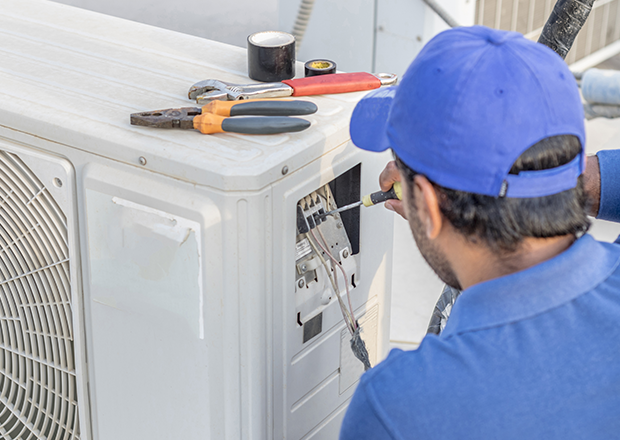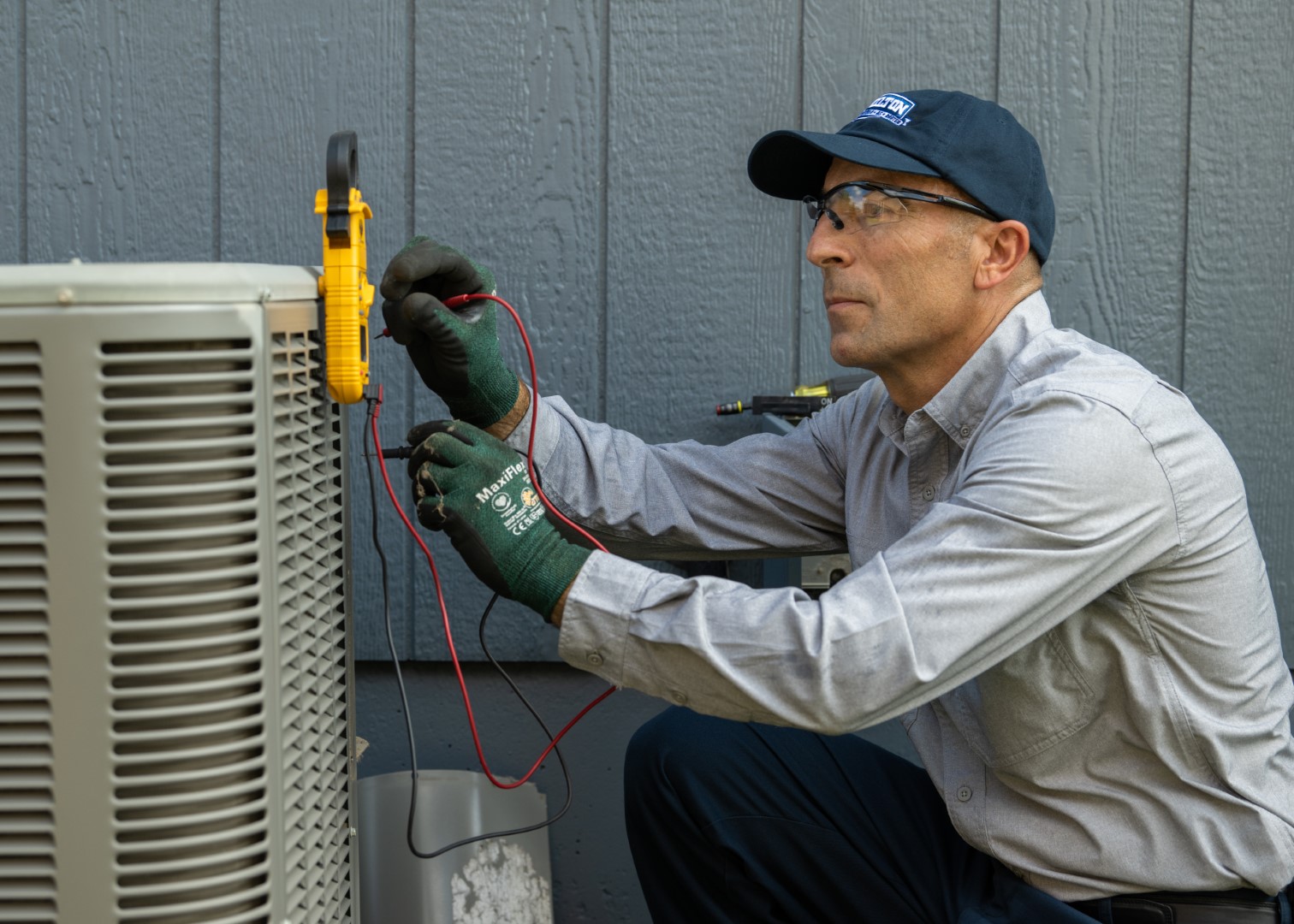HVAC company services explained: what homeowners should expect
Wiki Article
Everything about A/c: Identifying Common Issues and Effective A/c Repair Service Techniques
HVAC systems are crucial for maintaining indoor convenience. Comprehending their components and functionality is vital for determining common issues. Property owners commonly encounter troubles such as ineffective air conditioning, unusual smells, or rising energy expenses. These indications can indicate underlying concerns that may need attention. Discovering do it yourself troubleshooting strategies can be useful, yet knowing when to look for professional aid is equally crucial. What actions can be required to guarantee durable efficiency?Understanding Your Heating And Cooling System: Parts and Performance
A HVAC system, often considered the backbone of indoor climate control, consists of numerous crucial parts that function together to control temperature and air top quality. The primary elements consist of the home heating device, air flow system, and cooling device. The heating device, commonly a heating system or boiler, generates warmth throughout colder months, while the a/c device cools interior rooms during the summer season.
Typical Heating And Cooling Problems House Owners Encounter
House owners usually face numerous typical heating and cooling issues, consisting of inconsistent temperature level circulation throughout their living spaces. Additionally, uncommon noises throughout operation can suggest underlying issues that need interest. Resolving these problems quickly is important for maintaining excellent system performance.Irregular Temperature Circulation
Lots of households experience the discouraging issue of inconsistent temperature distribution, where specific rooms really feel uncomfortably warm while others stay also cool. This trouble frequently occurs from a range of variables, including poor insulation, blocked vents, or a poorly sized HVAC system. When ducts are not sufficiently secured or when furniture blocks air movement, some areas might receive inadequate air conditioning. In addition, thermostat positioning can substantially influence temperature level regulation; a thermostat located in a sunlit area might misrepresent the overall temperature level of the home. Routine maintenance, including cleaning filters and making sure ductwork is clear, can help ease these inconsistencies. House owners may additionally consider zoning systems to much better control temperature levels throughout different locations of the home, advertising a much more comfy living environment.Uncommon Sounds Throughout Procedure
When a HVAC system runs, unusual sounds can suggest underlying problems that require focus. Home owners might run into a variety of sounds, such as grinding, squealing, or hissing. Grinding sounds commonly signal worn-out bearings or parts, while squeaking can suggest loose belts or components requiring lubrication. Hissing may show a refrigerant leakage, which can jeopardize the system's effectiveness. In addition, banging noises may aim to loosened ductwork or a problem with the blower follower. Each of these sounds works as a warning, triggering home owners to check out even more. Ignoring these indicators can result in even more significant issues and pricey repair work. Normal upkeep and punctual focus to uncommon noises can boost system long life and performance, making certain a comfy living atmosphere.Indications That Indicate Your Air Conditioner Demands Repair Work
Just how can one inform if their air conditioning unit wants fixing? Several indicators might indicate underlying issues requiring expert focus. Initially, if the air conditioning fails to cool the room efficiently, it might recommend a refrigerant leakage or compressor breakdown. Furthermore, an increase in energy costs without corresponding usage adjustments might signify ineffectiveness in the system. Home owners should also look out to uncommon smells originating from the device, which can suggest mold and mildew development or electrical issues. If the AC frequently cycles on and off, it might be a sign of a malfunctioning thermostat or other mechanical troubles. Finally, the visibility of water pooling around the unit can show a stopped up drainpipe line. Identifying these indicators early can conserve money and time, making sure that the cooling system runs effectively and efficiently.Do It Yourself Troubleshooting Techniques for Cooling And Heating Issues
When encountering cooling and heating issues, homeowners can employ a number of do it yourself troubleshooting strategies to determine the problem. Secret approaches consist of checking thermostat settings, inspecting air filters, and assessing water drainage problems. These steps can aid pinpoint typical breakdowns before seeking expert assistance.Examining Thermostat Settings
What steps should house owners take to ensure their thermostat setups are correct? They need to confirm the thermostat is set to the wanted temperature and mode, whether heating or cooling. Inspecting for a clear screen and validating the thermostat is not established to "hold" or "getaway" mode is crucial. Property owners should likewise confirm that the thermostat is degree and mounted in a location without drafts, straight sunlight, or other temperature level affects. Additionally, rectifying the thermostat can help provide precise analyses. If the thermostat runs on batteries, changing them might solve any problems. By methodically assessing these variables, home owners can often determine and correct thermostat-related troubles, advertising suitable cooling and heating system performance.Inspecting Air Filters
Air filters play a crucial duty in preserving suitable heating and cooling efficiency. They catch dust, allergens, and other bits, making sure tidy air flow. With time, filters can become clogged, reducing air flow and efficiency. To examine air filters, individuals should initially situate the filter, usually located in the return duct or near the furnace. Once located, they ought to evaluate the filter's condition-- if it shows up unclean or stained, it most likely demands substitute. Most filters require changing every 1-3 months, depending on use and ecological variables. Regular examination and timely substitute of air filters not only boost air quality however likewise lengthen the lifespan of heating and cooling systems, avoiding potential breakdowns and expensive fixings.
Examining Drainage Issues
Exactly how can house owners efficiently determine and attend to drain concerns within their heating and cooling systems? Initially, they need to evaluate the condensate drain line for blockages or clogs, which can cause water build-up. Homeowners might utilize a wet/dry vacuum cleaner to remove any type of debris see this page obstructing the line. Next off, examining the drainpipe pan for corrosion or leaks is important, as a damaged pan can create water to overflow. Normal cleaning of the drain line with a mixture of vinegar and water aids avoid future obstructions. In addition, guaranteeing appropriate slope of the drainpipe line advertises efficient water circulation. If these do it yourself strategies do not deal with the problem, seeking advice from a professional cooling and heating technician may be that site necessary to prevent potential water damages and system failure.When to Call an Expert for AC Fixings

While some air conditioner issues can be taken care of with DIY approaches, there are scenarios where calling a specialist comes to be vital. Home owners must seek expert assistance when they experience persistent troubles, such as insufficient cooling, strange noises, or unusual odors emanating from the system. These signs and symptoms may show deeper concerns that require specialized knowledge and tools to detect and fix appropriately.

Preventative Maintenance Tips for Cooling And Heating Long Life
Regular preventative upkeep can substantially boost the longevity of heating and cooling systems. Property owners should arrange yearly inspections by certified service technicians to assess system efficiency and identify possible problems. Consistently transforming or cleaning up air filters is vital, as this assurances correct air movement and decreases pressure on the system. In enhancement, checking and securing ductwork protects against energy loss and enhances general efficiency.
It is likewise recommended to keep the exterior system clear of debris and plants, enabling peak airflow and warmth exchange. Home owners need to evaluate the condensate drainpipe for blockages to avoid water damages and mold development. Preserving appropriate thermostat setups and using programmable options can improve power effectiveness. Finally, recording upkeep activities aids track service history and can help in determining reoccuring problems (AC repairman). By adhering to these preventative procedures, people can take full advantage of the performance and life expectancy of their HVAC systems
Regularly Asked Questions
Just how Typically Should I Replace My Heating And Cooling System Filters?
Heating and cooling system filters must generally be replaced every one to 3 months, relying on use, filter kind, and ecological variables. Routine replacement assists preserve performance and air high quality, guaranteeing peak system performance throughout the year.What Dimension Heating And Cooling System Do I Required for My Home?
To identify the ideal cooling and heating system dimension for a home, one have to take into consideration square footage, insulation top this post quality, and local climate. Consulting an expert can assist ensure maximum efficiency and comfort for the specific living area.Are There Eco-Friendly Heating And Cooling Options Available?
Yes, environmentally friendly HVAC alternatives are available, consisting of energy-efficient warm pumps, solar-powered systems, and geothermal heating. These choices reduce energy usage and environmental effect, advertising sustainability while maintaining reliable environment control for residential and business rooms.How Can I Boost My HVAC System's Power Effectiveness?
To improve heating and cooling power effectiveness, one can routinely keep the system, seal air leakages, install programmable thermostats, utilize energy-efficient filters, and warranty sufficient insulation throughout the home to reduce power usage and improve performance.
What Is the Average Life-span of an A/c System?
The average life-span of a heating and cooling system normally ranges from 15 to 25 years, depending on aspects such as upkeep, usage, and the top quality of installment. Regular maintenance can significantly expand its operational long life.Conclusion
In recap, a thorough understanding of cooling and heating systems encourages home owners to identify typical concerns and address minor problems efficiently. Identifying signs of malfunction, using do it yourself repairing strategies, and focusing on normal maintenance can improve system efficiency and effectiveness. When encountered with intricate repair services, enlisting expert aid is important to ensure safety and long life. By fostering recognition and proactive treatment, individuals can take pleasure in a comfortable indoor atmosphere while lessening unanticipated prices related to cooling and heating failings.Report this wiki page